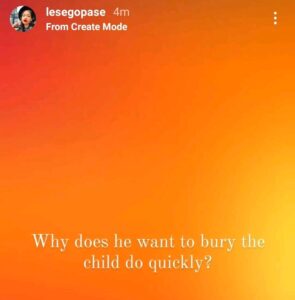
Lesego Pase’s story is a tragic tale of a mother’s love and loss. After a difficult separation from her child’s father, she has been fighting an uphill battle for access to her three-year-old son. The father, who has gained custody, lives with his girlfriend and employs two nannies to care for the child. Since May, Lesego has desperately sought permission to see her son, but her pleas have consistently been met with refusal.
Lesego’s attempts to involve the authorities have been futile. Despite her efforts to seek help from the police, the disparity in financial power and influence between her and the father has hindered any progress. The system seems to favor those with more resources, leaving Lesego feeling powerless and alone in her struggle.
Tragically, the situation took a devastating turn when Lesego received a phone call from the father. He delivered the heartbreaking news that their son had died. Shocked and grief-stricken, Lesego learned that he intended to bury the child the very next day. In a further act of exclusion, the father insisted that Lesego should not involve any family members in the funeral arrangements. Instead, she was told to meet him at the burial site, with no opportunity to say a final goodbye to her son.
This heartbreaking narrative highlights the complexities and challenges faced by many parents in custody disputes. Lesego’s story sheds light on the emotional turmoil that can ensue when one parent holds all the power, leaving the other feeling marginalized and voiceless. Her struggle is not just about access to her child; it’s a profound fight for recognition, love, and the right to grieve as a mother.
As the community learns of this tragic loss, it raises critical questions about parental rights and the support systems in place for families in similar situations. Lesego’s heartache serves as a reminder of the importance of empathy and understanding in custody battles, where the well-being of the child should always be the primary concern.
In a world where financial stability can overshadow emotional needs, Lesego’s plea for access to her son reflects a broader issue faced by many. It is a call to reevaluate the ways in which custody and access rights are determined, ensuring that every parent has the opportunity to maintain a bond with their child, regardless of their economic status.

Lesego’s story is not just a personal tragedy; it is a poignant reminder of the need for systemic change in how family law operates. As she navigates this unimaginable pain, we can only hope that her story inspires compassion and reform, ensuring that no parent has to endure such heartache in silence.




